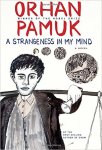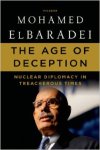A question that lay heavy in the minds of the readers this BYOB party(see Part 1) was the idea of light reading vs heavy reading. Does light reading define the book or the person reading it? What one calls light may be another person’s heavy. Tastes differ. The reads below wouldn’t classify as light.

Sumaa Tekur loves to read while she commutes. It was on one of those commutes in Mumbai that she came across a book called Strangeness in My Mind by Orhan Pamuk, a writer with an extreme sense of his own geography and who seems to be writing the same story over and over again, as Abhaya observed, though each time as beautifully as the next. The protagonist of almost all Pamuk’s books is Istanbul itself. The book takes us on a journey through the protagonist Mevlut’s life. Mevlut has a small trade and encounters his own miracles; through his story, Istanbul unravels itself in all its dusty dynamism.

Chandru, writer and researcher at Around io., finds the idea of discussing books at a BYOB party interesting. He was a regular reader and a huge fan of Sidney Sheldon, until spirituality kindled his interest. Farukh Dhondy’s Rumi: A New Translation reflects this fascination. Jalaluddin Rumi’s poems negotiate the divine and not so divine with a panache that no poet since has been able to imitate. Dhondy engages in a challenging feat when he translates the untranslatable as magic is hard to replicate.

Ralph encouraged everyone in the group to pick up Mohamed ElBaradei’s The Age of Deception: Nuclear Diplomacy in Treacherous Times. ElBaradei was Director of the UN’s International Energy Agency and he and his agency were recipients of the 2005 Nobel Peace Prize.
“It’s important to read books like these so that we get a clearer picture of the world. The message of the book is simple- intimidation and humiliation are not the best tactics to succeed in any conflict,” says Ralph.

Arisudan Yadav, Project Manager at Wipro, read a semi scientific drama called the Chariots of the Gods. The hypothesis of this book is that many of civilization’s achievements were bestowed upon us by aliens we saw as Gods. What happens when posterity arrives at an uncivilized place? Whether it’s the pyramids in Egypt or the bizarre runways in Latin America, there seems to be something at work, call it aliens, call it Gods, the choice is yours. As the conversation progressed, a questioned arose whether humans are necessary at all. As a species we are redundant, came one comment. To put things in perspective domesticated animals could not survive without us, said another.
Still in the sci-fi mindset, Abhaya mentioned that E.M.Forster’s story The Machine Stops has a visionary quality about in that it predicts instant messaging. Does the past indeed have all the answers? The conversation deepened and reference was made to the ancient epic Mahabharata.
We simply cannot have a BYOB party without any mention of the Mahabharata. More in Part 3.
